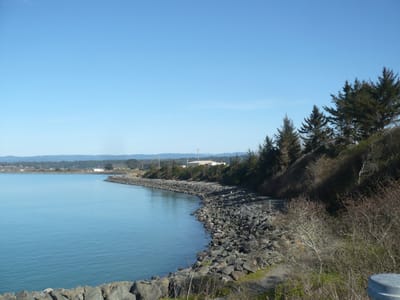About
Learn more about who we are and what we do.
Based in Eureka, California, Nature Provides is a woman-owned and family-run company. Since it's inception, the guiding principals have been a steadfast commitment to Mother Nature and natural living.
We hand-craft our potions in the USA from minimally-processed materials. We never use pre-made bases, questionable chemicals, or repackage existing products. Instead, our ingredients are thoughtfully researched, seeking those with the lowest environmental cost and safest history of use.
Most Nature Provides products are made to order to provide the maximum shelf-life possible without adding synthetic preservatives.
HOW IT ALL BEGAN
In search of a healthier lifestyle, we started the long journey of replacing the toxins in our lives with natural alternatives. But when we read the back labels of "organic" toiletries and cosmetics, they had the same dubious ingredients as the conventional products but were sold at twice the price, sometimes more.
If you are interested in contributing to our mission to rid the cosmetic market of toxins CLICK HERE to fund our R & D team!
As always, feel free to ask us questions and leave comments!
We hand-craft our potions in the USA from minimally-processed materials. We never use pre-made bases, questionable chemicals, or repackage existing products. Instead, our ingredients are thoughtfully researched, seeking those with the lowest environmental cost and safest history of use.
Most Nature Provides products are made to order to provide the maximum shelf-life possible without adding synthetic preservatives.
HOW IT ALL BEGAN
In search of a healthier lifestyle, we started the long journey of replacing the toxins in our lives with natural alternatives. But when we read the back labels of "organic" toiletries and cosmetics, they had the same dubious ingredients as the conventional products but were sold at twice the price, sometimes more.
- CHEMICALS IN ORGANICS
Take organic shampoo for example. Most shampoos use sudsing agents called surfactants, (surface-active agents). These are known to irritate the skin. Cocomide DEA is a surfactant derived from coconuts and is listed in California as a carcinogen. Because it is extracted from natural materials, companies will use it as a "natural" ingredient, despite its toxicity.
Decyl glucoside, the surfactant commonly used in "organic" shampoo, is derived from the sugar of coconuts and conventional or genetically-modified field corn. New chemicals like decyl glucoside are tested on animals and come from food crops that drive poverty, land and food insecurity, and environmental pollution.
There are so many pollutants and toxins found in body care products, including "organic" brands, that they are grouped into categories based on how they affect our bodies or environment, like endocrine disruptors. These chemicals affect the organs that regulate our hormones, which can lead to serious health consequences. And they harm aquatic life and other animals once they are rinsed down the drain. - THE ENVIRONMENTAL COSTS OF COSMETICS
The palm, coconut, and other tropical ingredients in bath and beauty products are often forgotten when calculating our carbon footprints. But these "natural" ingredients come at a huge humanitarian cost, too.
Tropical cash crops, owned mainly by foreign corporations, turn a nation's rainforest into plantations for profit. Pushed from the forest by this unregulated development, indigenous peoples lose their means of survival and animals lose their homes forever. The general population meanwhile continues to live in poverty as the profits leave their country into foreign pockets.
Rainforests around the world are disappearing to meet the demand for "natural" and "vegan" ingredients. Most natural soaps have some form of palm oil in them. 2.4 million acres of palms replace Indonesian rainforest every year. If this deforestation is not stopped, orangutan habitat could disappear in 10-20 years. - WHO DEFINES NATURAL and ORGANIC?
It was becoming clear that the claims made by natural and organic brands are often false or misleading. The ingredient list was our only tool to better understand what we were putting on our skin and how it affects the planet.
Then we learned that cosmetic manufacturers do not need to disclose all of the ingredients they use, if they file for an exemption with the FDA. Intending to protect trade secrets, this loophole can leave consumers in the dark.
So who should be stopping this "natural" fraud? - REGULATIONS
It turns out, the USDA's National Organics Standards Program only certifies agricultural products. Many brands take advantage of the unregulated organic cosmetics market and use the word "organic"on front labels and advertising, despite not being certified by the USDA or even meeting the guidelines.
The FDA doesn't require premarket approval of organic cosmetics either and has only banned 11 chemicals from use in all cosmetics, compared to over 1,000 that have been banned in the European Union. - THERE IS REASON TO HOPE
The situation is slowly changing as consumer groups like the Environmental Working Group and the Organic Consumers Association initiate educational programs, boycotts, and lobbying efforts like the Coming Clean Campaign to reveal organic fraud and strengthen organic cosmetic standards.
In the meantime, what were we to do? What was the point of eating organic food if we were covering ourselves in toxic, earth-polluting goop every morning?
The easiest action was to stop using body care products. However, some things we couldn't go without, like deodorant or soap, others we didn't want to, like makeup and lotion. Having tried homemade facials and lip balms before, we researched traditional recipes, those with ingredients that are natural, sustainable, and most importantly, effective. Eventually, we developed a line of personal care products for ourselves and have been using them for years.
We began sharing our creations with friends and family and it wasn't long before they asked if they could buy some.
If you are interested in contributing to our mission to rid the cosmetic market of toxins CLICK HERE to fund our R & D team!
As always, feel free to ask us questions and leave comments!



